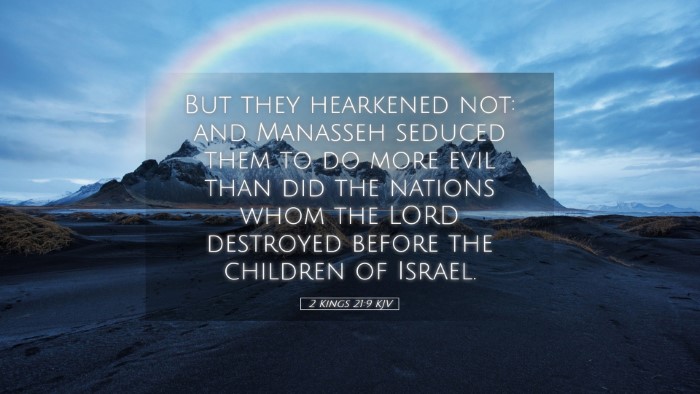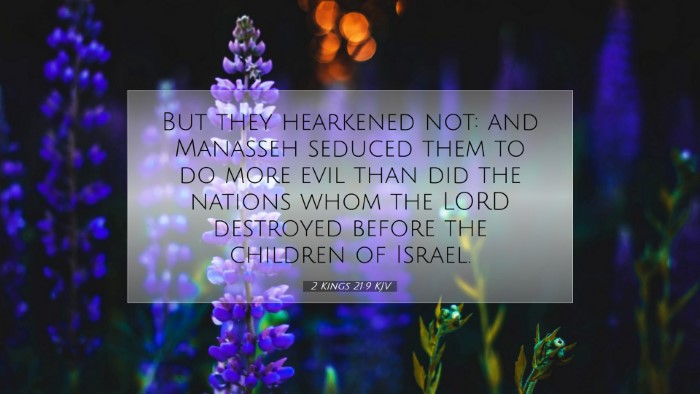Commentary on 2 Kings 21:9
Verse Context: 2 Kings 21:9 states, “But they hearkened not: and Manasseh seduced them to do more evil than did the nations whom the Lord destroyed before the children of Israel.” This verse highlights the reign of King Manasseh of Judah and the spiritual decline of the nation resulting from his leadership.
Overview of Manasseh's Reign
The account of King Manasseh serves as a solemn reminder of the consequences of turning away from the commandments of God. His reign, which marked one of the lowest points in Judah's spiritual history, is characterized by idolatry and the abandonment of Yahweh in favor of pagan practices.
Insights from Public Domain Commentaries
Matthew Henry's Commentary
Matthew Henry emphasizes that Manasseh's failure to listen to the warnings of God led to the people of Judah becoming increasingly corrupt. He notes that “they hearkened not” suggests a deliberate choice to ignore divine instruction. Henry sees this verse as indicative of a nation’s moral and spiritual decay.
- Spiritual Blindness: Henry points out that the people’s inability to hear God reflects a hardened heart and spiritual blindness, which can occur when one is steeped in sin.
- Leadership Influence: The influence of a leader is profound, and Manasseh’s seduction of the people illustrates that poor leadership can lead an entire nation astray.
- Comparative Evil: The comparison of Judah’s sins to those of the nations God had destroyed serves to underline that they exceeded even those nations in their wickedness, a sobering reality that testifies to the destructive power of sin.
Albert Barnes' Notes on the Bible
Barnes notes that the phrase “seduced them to do more evil” illustrates the active role that Manasseh played in encouraging wickedness. He elaborates that this wasn’t merely passive disobedience but an aggressive push towards idolatry and immoral practices.
- Idolatrous Practices: Barnes describes the various forms of worship that Manasseh introduced, including the worship of Baal and Asherah, which greatly offended God and corrupted the worship in the Holy Temple.
- Rebellion Against God: The verse highlights a profound rebellion against the covenant made with God, with Manasseh fostering a culture that was hostile to the very principles laid down by God.
- Historical Context: By reflecting on the historical context, Barnes suggests that the actions of Manasseh had detrimental effects that transcended his reign, impacting subsequent generations.
Adam Clarke’s Commentary
Adam Clarke provides a detailed analysis of this verse, noting the tragic implications of Manasseh's actions. He notes that Manasseh's reign is often seen as a pivotal point in Judah’s history where deep-rooted idolatry was established.
- Consequences of Idolatry: Clarke emphasizes that idolatry leads to a moral decline and spiritual chaos, which is evident in the subsequent actions of the people.
- Manasseh’s Repentance: While discussing Manasseh’s later repentance, Clarke juxtaposes it with this earlier period of seduction, underscoring the weight of turning away from God.
- Warnings for Future Generations: Clarke concludes that the narrative serves as a warning to future generations about the dangers of forsaking God and embracing worldly practices.
Theological Implications
This verse offers significant theological reflections for pastors, students, and scholars. The narrative of Manasseh serves as a powerful illustration of the effects of sin, the nature of spiritual leadership, and the dire consequences that can arise from a nation’s collective choices.
Key Theological Themes
- The Nature of Human Rebellion: The verse illustrates the inherent tendency of humanity to rebel against divine authority and the consequences that follow.
- Accountability in Leadership: Those in positions of influence bear a great responsibility; as demonstrated by Manasseh’s reign, their actions can lead an entire community towards or away from God.
- God’s Patience and Justice: While the people rejected God, His patience has limits. This leads to the inevitable judgment that is consistent throughout scripture.
- Lessons of Repentance: Manasseh’s later life serves as a testament to the potential for repentance and restoration, although this does not negate the consequences of prior actions.
Conclusion
2 Kings 21:9 stands as a sobering reflection on leadership, spiritual integrity, and communal responsibility. The insights from Matthew Henry, Albert Barnes, and Adam Clarke collectively provide a rich tapestry of understanding that emphasizes the importance of heeding God's voice amidst a world full of distractions and falsehoods. For modern readers, especially those in pastoral roles or theological study, it serves as both a warning and an encouragement to seek first the kingdom of God, fostering a culture that reflects His righteousness rather than succumbing to the seductions of the surrounding world.


